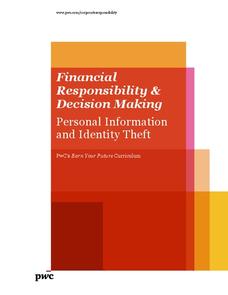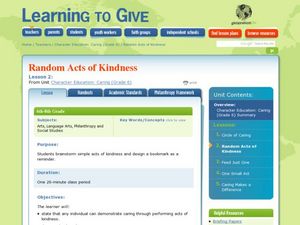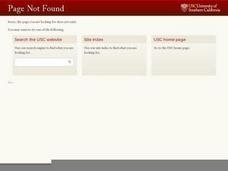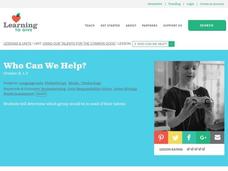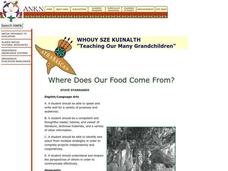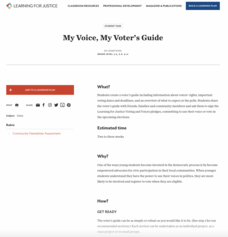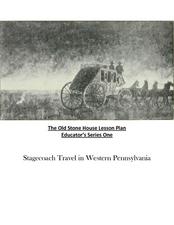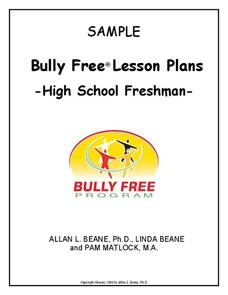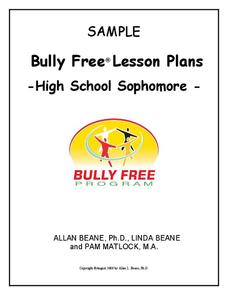Curated OER
Who Works at Our School?
Young interviewers will learn more about the school staff by asking them questions and creating a bulletin board display. They will learn how to make thoughtful interview questions, conduct professional interviews, and organize...
PwC Financial Literacy
Planning and Money Management: Spending and Saving
Financial literacy is such an important, and often-overlooked, skill to teach our young people. Here is a terrific lesson plan which has pupils explore how to come up with a personal budget. They consider income, saving, taxes, and their...
PwC Financial Literacy
Finanacial Responsibility and Decision Making: Personal Information and Identity Theft
Elementary schoolers look into the very real, and scary, practice of identity theft. They discover the main techniques used by people who steal other people's identity. Learners produce an identity theft tip sheet and share their tips...
PwC Financial Literacy
Evaluating Financial Information
Advertising is all around us. Sometimes those advertisements are directed at young people, so it's important for youngsters to recognize false advertising and fraud when they see it. That's what this instructional activity is all about....
Curated OER
Random Acts of Kindness
Students make a bookmark. In this community lesson, students review the meaning of caring. They discuss how doing small acts of kindness can affect a community, and they make a bookmark to remind them to do kind things for others.
Curated OER
Preserving the Past with Oral History
Pupils research history by interviewing people in their community. They create a list of questions and record their responses. They end the project with some type of final product which might include a memory book.
Curated OER
Volunteering Our Time
Students participate in a service learning project. In this philanthropy lesson, students volunteer their time at a local soup kitchen and reflect upon the experience in a journal.
Curated OER
Changes in the Community: Diversity of Learners Adaptation
Students determine the rate of travel through Ohio based on mode of transportation: walking, horse bak riding, railroad, and car. They are asked to write a sentence explaining how they would determine how long each trip takes. Students...
Curated OER
Our Barrio: Our Community/Adams & Normandie
Third graders examine various structures and people, including the region of Adams and Normandie, in Los Angeles. They conduct Internet research, and identify and locate features in the Adams/Normandie region during the past 60/70 years.
Curated OER
Who Can We Help?
Pupils define philanthropy. In this community service lesson, students assess as a group who at school needs help. Pupils write letters to offer their assistance where they've found areas of need.
Curated OER
Korea in Your Community
High schoolers identify Korean products sold in the US and become aware of Korea's importance in international trade.
Curated OER
What's Driving Us?
Learners determine what the people in their community are driving. Using traffic flow information, they develop recommendations on how to achieve sustainability. They calculate the carbon dioxide emission index for various sites and...
Curated OER
Friendly Neighbors
Young scholars review the days of the week and the meaning of unconditional kindness. In this days of the week and kindness lesson, students participate in a reading of Libba Moore Gray's Miss Tizzy. They talk about the days of the week...
Curated OER
WHERE DOES OUR FOOD COME FROM?
Students examine the sources, location and availability of local food, develop mapping skills, interact with Elders to gain pertinent information, and examine subsistence issues of the past and present.
National Center for Families Learning
The Summer Fun Summer Learning Dance Unit
Summer slide. Alas, not a term synonymous with a type of sliding board, summer slide refers to the fact that learning slips during summer break, especially in the areas of spelling and math facts. Enrich summer break with a...
Teaching Tolerance
My Voice, My Voter's Guide
Class members may be too young to vote, but that doesn't mean their voices are silent! After researching key information, such as policies for registering to what to expect at the polls, young scholars create and present election guides...
Curated OER
The Math in the Design and Building of Bridges
Research various types of bridge designs. Your class will be asked to consider what it would be like without bridges while learning about how they work. They will construct a model bridge based on given parameters. They then calculate...
Curated OER
Old Stone House Lesson Plan
From stagecoach to railroad tracks, your class will discover how advancements in travel in the United States during the nineteenth century played an integral role in the industrialization and development of American society. The main...
Bully Free Systems
Bully Free Lesson Plans—Ninth Grade
"Bullying and Prejudice" and "Do You Cyber Bully," two lessons from a complete Bully Free program, serve as samples of the approach used in a unit designed to bring awareness to and to combat bullying. Each lesson asks class members to...
Bully Free Systems
Bully Free Lesson Plans—10th Grade
Two lessons, "What Does Cyber Bullying Look Like?" and "Factors Influencing My Reporting the Bullying of Others," serve as examples of the 12 included in a Bully Free curriculum. Each plan includes discussion questions, an activity, and...
Illinois Department of Natural Resources
Section Two: Why is Biodiversity Important?
Explore soil, genetic traits, natural resources, and pollution in a series of lessons that focus on biodiversity. Kids complete experiments to learn more about the importance of varied genes and organisms in an ecosystem.
Council for the Curriculum, Examinations and Assessment
Safety and Managing Risk
Is it worth the risk? Class members examine a framework for assessing and managing risks and then apply the model to the provided scenarios. To conclude the session individuals apply the model to a personal situation and record their...
American Museum of Natural History
What's the Big Deal About Water?
It may seem simple, but water is one of the most unique substances on Earth. An interactive online lesson describes its properties and importance in so many different situations. Learners interact with the lesson to learn the role water...
PBS
Who Knows Best
Finding an expert in a given field when conducting research can be a challenge. This guide provides step-by-step directions as well as links to resources that help young sleuths find the authorities and experts they need. As a bonus, two...




